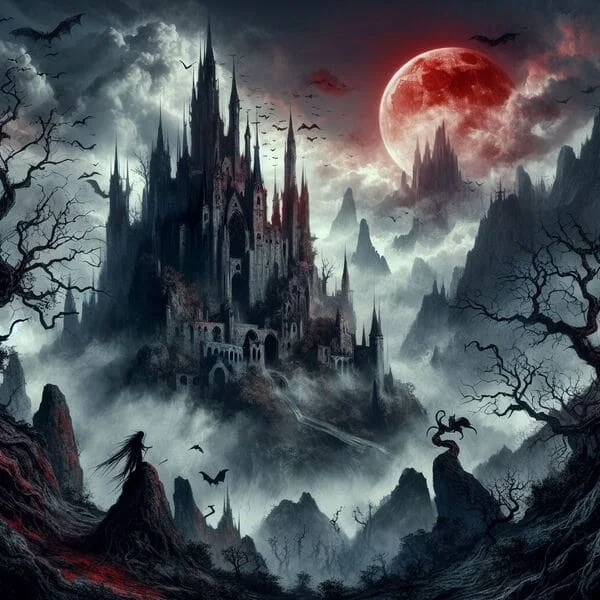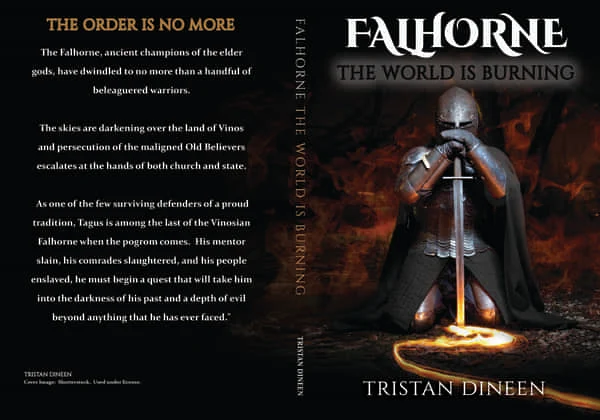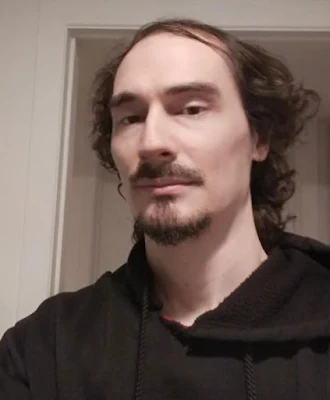Author Interview 007: Tristan Dineen - Crafting Dark Realms
Tristan Dineen, a prolific writer hailing from the frosty expanse of Canada, is a master at weaving tales of dark fantasy. His Falhorne series has captured the imaginations of readers worldwide, plunging them into worlds where heroes face overwhelming odds and moral ambiguity reigns supreme.
Dark Fantasy Illuminated: Author Interview with Tristan Dineen
In this exclusive interview, Dineen shares insights into his writing process, the inspirations behind his work, and the intricate layers of his fantasy realms. From the complexities of character development to the real-world parallels embedded within his narratives, Dineen offers a glimpse into the captivating depths of his imagination.
Featured Excerpts
"I was drawn to the genre of darker, grittier fantasy because it more closely mirrored the medieval European history I’d been interested in while growing up... dark fantasy allows an author to explore real-world themes to a greater extent than traditional fantasy would permit."
"Like I said before, I’m very much inspired by history and historical civilizations... There are very real parallels to actual history here and I believe it makes the fantasy world I’ve created, and the struggles of its people, more believable."
"Fantasy worlds are similar in that they allow us to communicate real-world themes in a setting removed from the real world, making them easier for people of different backgrounds and politics to accept."
Related post: Calling All Writers: Free Author Interviews! (2024)
Full Questions and Answers
1. What drew you to the genre of dark fantasy, and how do you believe it allows you to explore themes and narratives differently than other genres?
I was drawn to the genre of darker, grittier fantasy because it more closely mirrored the medieval European history I’d been interested in while growing up. The more you learn about history, the less you believe in fairy tales about simple morality and clear divisions between good and evil. I wanted my fantasy world to be just as complex and believable as Medieval Europe or the Ancient Mediterranean. Good guys and bad guys still exist, but they live in a world governed by overarching political and economic forces that shape behavior and are far more complicated characters than a writer like Tolkien would allow. It follows that dark fantasy allows an author to explore real world themes to a greater extent than traditional fantasy would permit.
2. The Falhorne series seems to delve into themes of loss, redemption, and the struggle against overwhelming odds. Can you speak to the inspiration behind these themes and how they manifest in your writing?
In the real world, people who challenge oppressive systems of power do not have access to secret arsenals of space-age weapons technology or magic so powerful that it can negate any advantages their enemies have. Real-world heroes are almost always outgunned and lack anything close to the resources their powerful enemies have. Real-world heroes die. Real-world heroes experience loss. While fantasy worlds will always offer advantages that the real world does not give, I wanted to emphasize the immense challenges that someone resisting entrenched power structures must face. It makes the hero’s eventual triumph, or even their mere survival, all the more heroic.
3. The world of Titanus, as depicted in your novels, feels rich and immersive. How do you go about world-building, and what elements do you find most important in creating a believable and captivating fantasy setting?
Like I said before, I’m very much inspired by history and historical civilizations. Vinos is very much like Renaissance Italy, and, like Italy, was born out of a fallen empire similar to Rome. Vinos has a largely feudal economy but that is beginning to change due to the demand for “satincane” in the textile mills of Tarn, a rising empire to the north. The profits from this trade have allowed the reigning Prince of Vinos to centralize political power and the crackdown on the Old Believers is not only due to their refusal to follow the established state religion but also because the prince wants more slaves to work the plantations producing satincane for export. There are very real parallels to actual history here and I believe it makes the fantasy world I’ve created, and the struggles of its people, more believable.
4. In "Falhorne: The World Is Burning," the protagonist Tagus faces significant challenges and losses. What can readers expect from his character arc throughout the series, and how do you approach character development in your writing?
What little stability Tagus enjoys in his life collapses very early in the story, and, for the first time, he must largely determine his own path with the help of often unexpected friends and allies. While he struggles to uphold is honor as one of the ancient Falhorne warriors and defend the Old Believers, he is confronted by situations that force him to confront his past and the very core of who he is. The political and economic forces of Vinos were not made to benefit someone like Tagus and he must struggle to make his way in the world; striving toward his goals against heavy odds. It could not be any other way for someone in his circumstances.
Check out his masterful storytelling on Amazon: Falhorne: The World Is Burning and Falhorne: Dark Dawn.
5. Your favorite authors include Patrick Rothfuss, Michael Moorcock, Ursula Le Guin, and John Bellairs. How have their works influenced your writing style and storytelling approach?
Patrick Rothfuss’s main character in the Kingkiller Trilogy is a very complex personality trying to make his way in a world where the odds are stacked against him. Moorcock and Le Guin are excellent at creating believable fantasy worlds populated with believable characters. John Bellairs is a masterful writer who does not get nearly as much credit as he deserves. His ability to weave humor and horror together in the same narrative is second to none.
6. The persecution of the Old Believers and the dwindling of the Falhorne order are central elements of your series. What inspired you to explore these themes, and how do you approach incorporating real-world issues into your fantasy narrative?
Early Modern Europe was full of religious persecution as states like Spain, France, and England centralized and defined themselves in political and religious terms. Vinos and the wider region are undergoing a similar process with similarly bloody results: whole groups are politically marginalized, religiously persecuted, and economically exploited because they do not fit into the new order of things. Old Believers are killed, enslaved, forced into slums, or driven into exile. The German playwright Bertolt Brecht set his anti-war play Mother Courage and Her Children in the 17th Century, although he was really trying to warn people about the coming outbreak of World War II. He did this because he knew his audience would be biased if he set it in the 20th Century and that he would be more likely to get his message across if he set the story in a different time. Fantasy worlds are similar in that they allow us to communicate real-world themes in a setting removed from the real world, making them easier for people of different backgrounds and politics to accept.
7. As a Canadian author yourself, could you recommend some of the best works of Canadian literature that you believe everyone should read? How have these works influenced your own writing journey, if at all?
Although it pains me to say it, Canadian fiction has really not influenced my fantasy writing to any appreciable degree.
8. What advice would you give to aspiring writers, particularly those looking to venture into the realm of dark fantasy?
You must start writing. You don’t necessarily have to have a plan. I wrote the prologue of Falhorne: The World is Burning purely on inspiration and it took a while for the larger plot (and world) to become clear in my mind. That’s OK. Just start writing and go where the characters lead you.
9. Finally, what can readers expect from you in the future? Are there any upcoming projects or directions in your writing that you're particularly excited about?
With the Falhorne series complete (begun with Falhorne: The World is Burning and concluded with Falhorne: Dark Dawn), I have started work on a new series that will be set in a very different part of the same fantasy world. Instead of Renaissance Italy, this region is more like Medieval South Asia, but the main character is similarly confronted by a nightmare power that is not of this world – and that may devour it if not stopped.
Conclusion
Tristan Dineen's insights into the craft of dark fantasy offer a tantalizing glimpse into the worlds he creates. As readers eagerly anticipate his upcoming projects, they are reminded of the power of storytelling to transport us to realms both familiar and fantastical.
About Tristan Dineen
Tristan Dineen is a Canadian author known for his captivating dark fantasy novels. With the Falhorne series under his belt, he continues to push the boundaries of the genre, inviting readers to explore the depths of his imagination. Stay tuned for his upcoming projects and immerse yourself in worlds where darkness and heroism collide. Visit his blog: https://titanustribune.blogspot.com/










